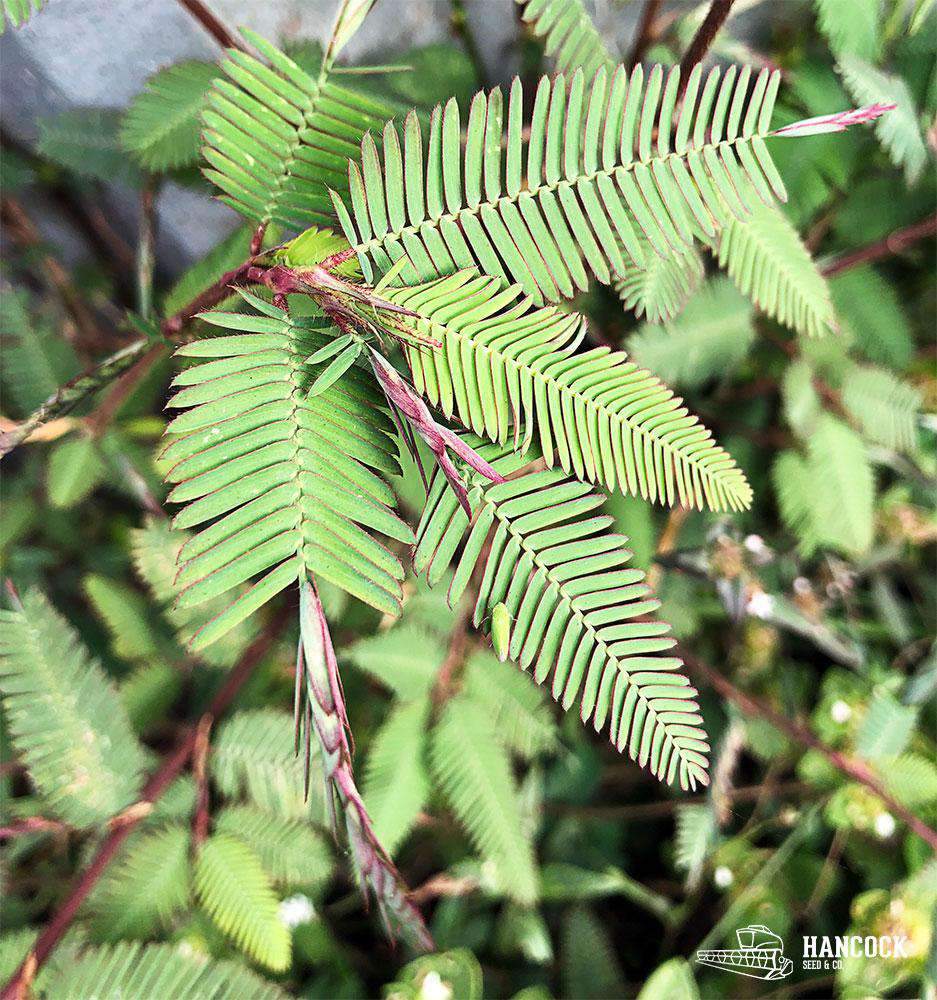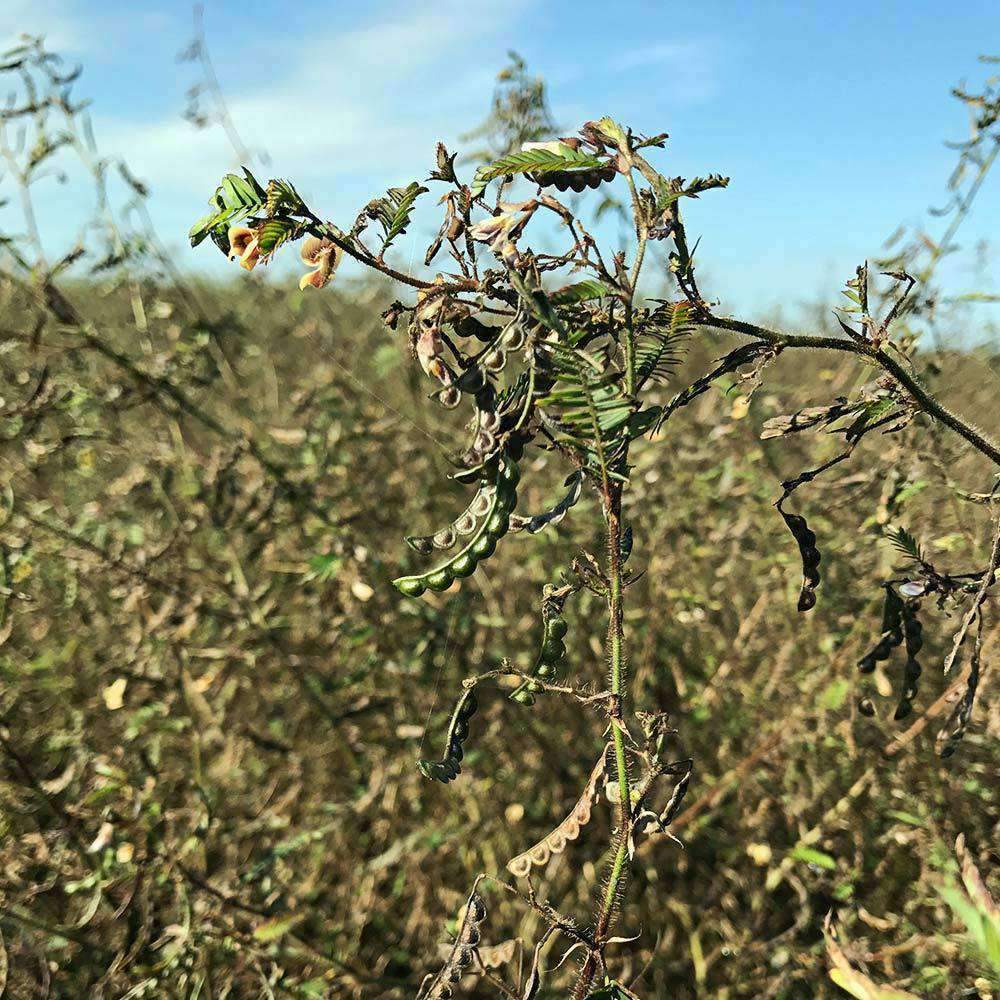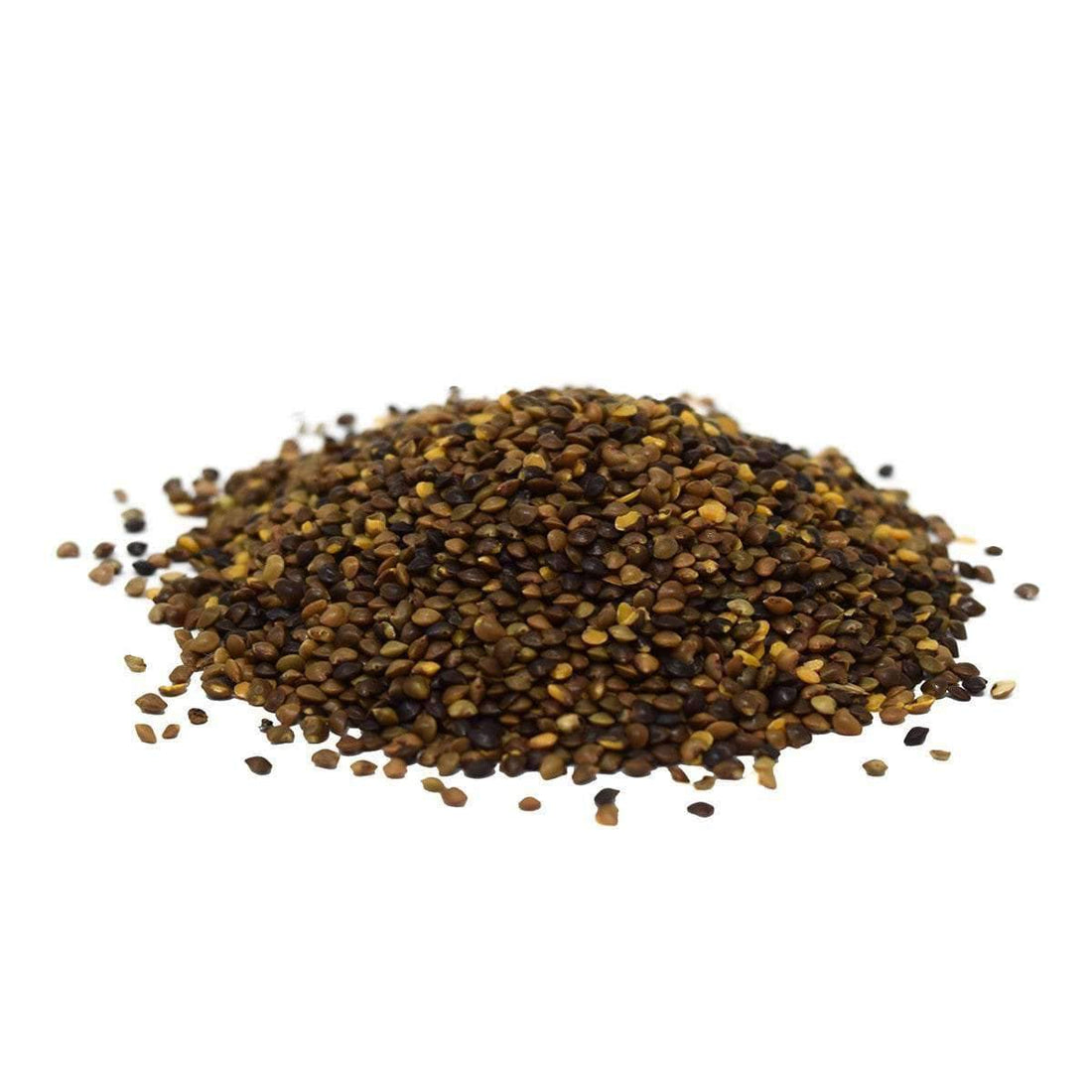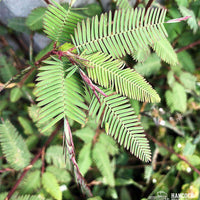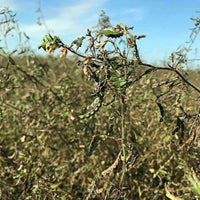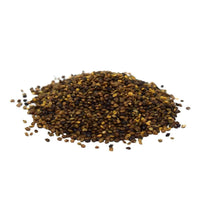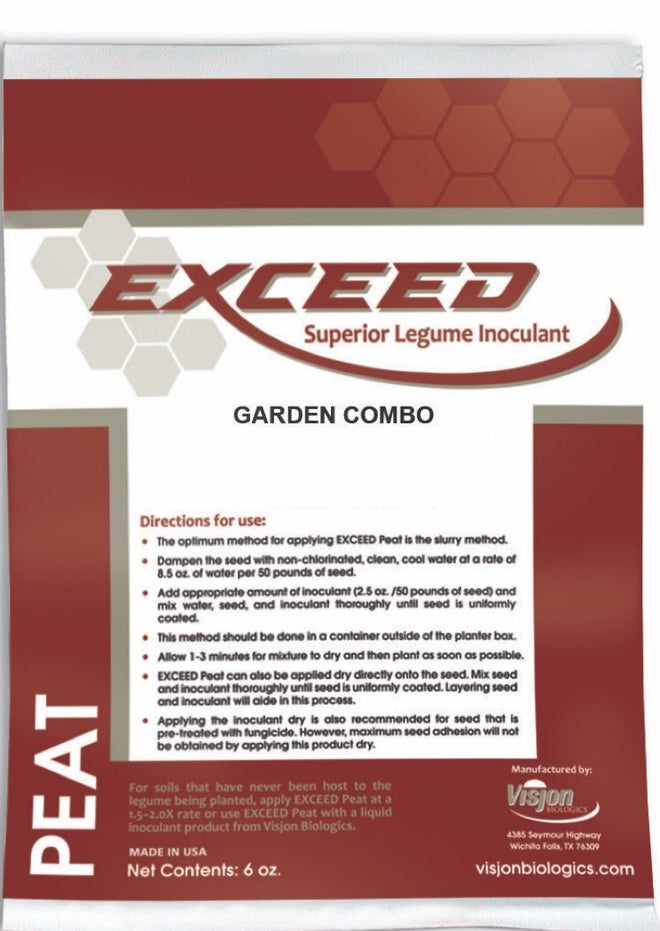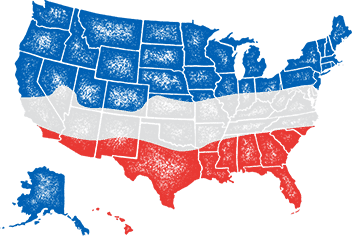
- When to plant:
- Spring, Summer
- Fertilizer:
- 10-10-10 All Purpose Fertilizer
- Seeding rate:
- 25 - 35 lbs. per acre
- Overseeding rate:
- 20 - 25 lbs. per acre
- Seeding rate drilling:
- 25 - 35 lbs. per acre
- Seeding depth:
- 1/4 inch
- Ideal ph:
- 5.5 - 6.5
- Gmo:
- No
- Inoculant needed:
- EL Type Inoculant - Garden Combo
- Coated or raw:
- Raw
- Lifecycle:
- Annual
- Climate zones:
- Cool Season, Transition Zone, Warm Season
Aeschynomene is a warm season legume also known as "Joint-Vetch", "Deer Vetch", and "American Joint Vetch". It is a perfect choice as a high protein ingredient for Spring & Summer food plots for wildlife. Aeschynomene grows exceptionally well in low bottom areas where moisture is commonly found. Aeschynomene is considered one of the easiest wildlife food plots to establish with the highest protein content.
Product Information
- Application or Use: Food Plot, Ground Cover, Cover Crop, Livestock Grazing
- Germination Time: 7 - 14 days, under optimal conditions
- Growing Locations: Warm Season, Transition Zone & Cool Season
- Height: Approximately 3 - 6 feet
- Sunlight Requirements: 8+ hours, full sun for best results
- Advantages: More tolerant of poorly drained soil conditions than drought
- When to Plant: Recommended planting time is spring and summer when nighttime temperatures are consistently 65+ degrees and 3 months prior to first frost.
Characteristics
Aeschynomene is a warm season legume also known as "Joint-Vetch", "Deer Vetch", and "American Joint Vetch". It is a perfect choice as a high protein ingredient for Spring & Summer food plots for wildlife. Aeschynomene grows exceptionally well in low bottom areas where moisture is commonly found. Aeschynomene is considered one of the easiest wildlife food plots to establish with the highest protein content.
Aeschynomene is a very popular option for cattle and wildlife food plots as it is very palatable to cattle and deer and an excellent source of protein. We do not recommend aeschynomene for hay or silage due to its high moisture content and mucilaginous consistency.
Aeschynomene Americana, or Common Aeschynomene, is a true annual that flowers and produces seed in the early fall; plants usually die after seed has matured. Aeschynomene is considered a slow growing legume, and it will take a 'pause' as it works to establish a root system prior to sprouting up. It grows best on moist, fertile soils with surface drainage. The plant will reach a height of 3 to 6 ft. tall at maturity.
The raw seed is just how it sounds, seed in the purest form - not coated or mixed with anything. The seed is not pre-inoculated. EL Type inoculant is recommended for Alyce Clover, American Joint Vetch (Aeshynomene), Cowpeas, Lablab, Lespedeza, Hairy Indigo, Carpon Desmodium, Peanut, Mung Beans, & Partridge Peas.
Many legumes (e.g., clovers, alfalfa, birdsfoot trefoil, soybeans, peas) are excellent choices for wildlife food plots. Legumes are plants that bear seed in a pod and have a symbiotic relationship with certain species of nitrogen-fixing bacteria (i.e., Rhizobium, Bradyyrizobium spp.). These bacteria attach themselves to the roots of the legumes and form nodules. From these nodules, the bacteria extract nitrogen from the air. Rhizobia obtain energy from the plant, while the plant receives nitrogen produced by the bacteria. Thus, both bacteria and plant benefit form the relationship. this phenomenon is important when planting wildlife food plots for three reasons: 1.) minimal nitrogen fertilization is required, 2.) nitrogen is not a limiting factor to properly inoculated plants and 3.) weed competition is reduced since little nitrogen fertilizer is applied.
It is important to use species-specific inoculant for for the legume being planted. Although Rhizobia, are found naturally in the soil, it is critical to inoculate seed prior to planting to ensure that the proper species of Rhizobia is in contact with the seed.
*Product packaging may appear different than what is pictured.
Soil Prep
- When choosing to seed a clean seedbed, remove old vegetation by using a dethatcher, power rake or tiller to kill the existing vegetation. Rake or drag the area to remove debris and dead thatch for a clean area. Ensure the soil is leveled and loosened to allow the seed to have good soil contact once spread on a clean seed bed.
- If you have an area with heavy weed coverage, we recommend starting fresh by killing and removing the existing vegetation. If you choose to use chemicals, herbicides or fertilizers, you must check with the product’s manufacturer prior to planting new seed to ensure the proper waiting period.
- When overseeding an existing area, mow at the lowest setting. Rake or drag any areas that have dead thatch or debris.
Seeding
- Recommended planting time is spring and summer when night time temperatures are consistently 65+ degrees and 3 months prior to first frost.
- The seed is not pre-inoculated. EL Type inoculant is recommended for Alyce Clover, American Joint Vetch (Aeshynomene), Cowpeas, Lablab, Lespedeza, Hairy Indigo, Carpon Desmodium, Peanut, Mung Beans, & Partridge Peas.
- Spread at the recommended rate based on total area and whether it is bare ground or pre-existing vegetation.
- Spreader Settings: There is not any one setting that applies for all brands of spreaders. We recommend reviewing the seed settings chart that came with your spreader or contact the manufacturer directly. Ensure you are choosing a seed on the list by the manufacturer that closely resembles the seed you are choosing to plant.
- If you have any concerns on what setting you should use, we recommend always starting with the smallest option then adjusting it to match the recommended seeding rate.
Fertilizer
- We recommend fertilizing with 10-10-10 All Purpose Fertilizer. 10-10-10 All Purpose Fertilizer can be spread at a rate of 10 lbs. per 1,000 sq. ft. for 1 lb. of Nitrogen per 1,000 sq. ft. or 500 lbs. per acre for 50 lbs. of N per acre. The most probable cause of a declining growth or soil is poor nutrition. If you have any concerns about your soil, we recommend getting your soil tested to determine what nutrients you are low in as well as your pH. The results of the soil testing will give you the best information to amend your soil for the best grass growth.
Watering Schedule
- Aeschynomene grows best on moist, fertile soils, with surface drainage.
Mowing or Grazing Requirements
- Rotational grazing is recommended when plants reach a height of 18 inches. Graze the plants back to about 8 to 14 inches and move to the next pasture. Maintaining a 14 inch stubble will allow for maximum regrowth and good seed production.
Germination Time
- 7 - 14 days, under optimal conditions
- Aeschynomene is considered a slow growing legume, and it will take a 'pause' as it works to establish a root system prior to sprouting up.
For best results, please review our Planting Guide and the specific product description before planting. Each product has recommended planting methods, timing, and seeding rates that are important for successful establishment. Following these guidelines will help ensure optimal performance and stand success.

Seed Quality
Hancock Seed is dedicated to delivering the best seeds possible to our customers. Hancock Seed grows and harvests many of our products, and we acquire the majority of the rest from other family farmers.
All these seeds are processed, packaged and shipped from Hancock Farm. This helps us ensure that our high standards are met. Unlike much of the competition, we refuse to sell you a seed that was not gathered during the last harvest. You will always receive fresh product from Hancock.
Every seed we grow comes with 40 years of experience behind it...you can rest assured that all of our products are cultivated in a method that assures its potential for growth.
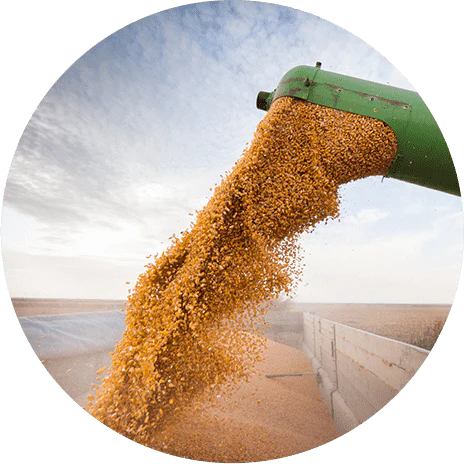
Your cart ( 0 )

Aeschynomene is a warm season legume also known as "Joint-Vetch", "Deer Vetch", and "American Joint Vetch". It is a perfect choice as a high protein ingredient for Spring & Summer food plots for wildlife. Aeschynomene grows exceptionally well in low bottom areas where moisture is commonly found. Aeschynomene is considered one of the easiest wildlife food plots to establish with the highest protein content.
Product Information
- Application or Use: Food Plot, Ground Cover, Cover Crop, Livestock Grazing
- Germination Time: 7 - 14 days, under optimal conditions
- Growing Locations: Warm Season, Transition Zone & Cool Season
- Height: Approximately 3 - 6 feet
- Sunlight Requirements: 8+ hours, full sun for best results
- Advantages: More tolerant of poorly drained soil conditions than drought
- When to Plant: Recommended planting time is spring and summer when nighttime temperatures are consistently 65+ degrees and 3 months prior to first frost.
Characteristics
Aeschynomene is a warm season legume also known as "Joint-Vetch", "Deer Vetch", and "American Joint Vetch". It is a perfect choice as a high protein ingredient for Spring & Summer food plots for wildlife. Aeschynomene grows exceptionally well in low bottom areas where moisture is commonly found. Aeschynomene is considered one of the easiest wildlife food plots to establish with the highest protein content.
Aeschynomene is a very popular option for cattle and wildlife food plots as it is very palatable to cattle and deer and an excellent source of protein. We do not recommend aeschynomene for hay or silage due to its high moisture content and mucilaginous consistency.
Aeschynomene Americana, or Common Aeschynomene, is a true annual that flowers and produces seed in the early fall; plants usually die after seed has matured. Aeschynomene is considered a slow growing legume, and it will take a 'pause' as it works to establish a root system prior to sprouting up. It grows best on moist, fertile soils with surface drainage. The plant will reach a height of 3 to 6 ft. tall at maturity.
The raw seed is just how it sounds, seed in the purest form - not coated or mixed with anything. The seed is not pre-inoculated. EL Type inoculant is recommended for Alyce Clover, American Joint Vetch (Aeshynomene), Cowpeas, Lablab, Lespedeza, Hairy Indigo, Carpon Desmodium, Peanut, Mung Beans, & Partridge Peas.
Many legumes (e.g., clovers, alfalfa, birdsfoot trefoil, soybeans, peas) are excellent choices for wildlife food plots. Legumes are plants that bear seed in a pod and have a symbiotic relationship with certain species of nitrogen-fixing bacteria (i.e., Rhizobium, Bradyyrizobium spp.). These bacteria attach themselves to the roots of the legumes and form nodules. From these nodules, the bacteria extract nitrogen from the air. Rhizobia obtain energy from the plant, while the plant receives nitrogen produced by the bacteria. Thus, both bacteria and plant benefit form the relationship. this phenomenon is important when planting wildlife food plots for three reasons: 1.) minimal nitrogen fertilization is required, 2.) nitrogen is not a limiting factor to properly inoculated plants and 3.) weed competition is reduced since little nitrogen fertilizer is applied.
It is important to use species-specific inoculant for for the legume being planted. Although Rhizobia, are found naturally in the soil, it is critical to inoculate seed prior to planting to ensure that the proper species of Rhizobia is in contact with the seed.
*Product packaging may appear different than what is pictured.
Soil Prep
- When choosing to seed a clean seedbed, remove old vegetation by using a dethatcher, power rake or tiller to kill the existing vegetation. Rake or drag the area to remove debris and dead thatch for a clean area. Ensure the soil is leveled and loosened to allow the seed to have good soil contact once spread on a clean seed bed.
- If you have an area with heavy weed coverage, we recommend starting fresh by killing and removing the existing vegetation. If you choose to use chemicals, herbicides or fertilizers, you must check with the product’s manufacturer prior to planting new seed to ensure the proper waiting period.
- When overseeding an existing area, mow at the lowest setting. Rake or drag any areas that have dead thatch or debris.
Seeding
- Recommended planting time is spring and summer when night time temperatures are consistently 65+ degrees and 3 months prior to first frost.
- The seed is not pre-inoculated. EL Type inoculant is recommended for Alyce Clover, American Joint Vetch (Aeshynomene), Cowpeas, Lablab, Lespedeza, Hairy Indigo, Carpon Desmodium, Peanut, Mung Beans, & Partridge Peas.
- Spread at the recommended rate based on total area and whether it is bare ground or pre-existing vegetation.
- Spreader Settings: There is not any one setting that applies for all brands of spreaders. We recommend reviewing the seed settings chart that came with your spreader or contact the manufacturer directly. Ensure you are choosing a seed on the list by the manufacturer that closely resembles the seed you are choosing to plant.
- If you have any concerns on what setting you should use, we recommend always starting with the smallest option then adjusting it to match the recommended seeding rate.
Fertilizer
- We recommend fertilizing with 10-10-10 All Purpose Fertilizer. 10-10-10 All Purpose Fertilizer can be spread at a rate of 10 lbs. per 1,000 sq. ft. for 1 lb. of Nitrogen per 1,000 sq. ft. or 500 lbs. per acre for 50 lbs. of N per acre. The most probable cause of a declining growth or soil is poor nutrition. If you have any concerns about your soil, we recommend getting your soil tested to determine what nutrients you are low in as well as your pH. The results of the soil testing will give you the best information to amend your soil for the best grass growth.
Watering Schedule
- Aeschynomene grows best on moist, fertile soils, with surface drainage.
Mowing or Grazing Requirements
- Rotational grazing is recommended when plants reach a height of 18 inches. Graze the plants back to about 8 to 14 inches and move to the next pasture. Maintaining a 14 inch stubble will allow for maximum regrowth and good seed production.
Germination Time
- 7 - 14 days, under optimal conditions
- Aeschynomene is considered a slow growing legume, and it will take a 'pause' as it works to establish a root system prior to sprouting up.
Instructions
For best results, please review our Planting Guide and the specific product description before planting. Each product has recommended planting methods, timing, and seeding rates that are important for successful establishment. Following these guidelines will help ensure optimal performance and stand success.















